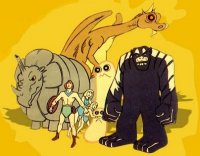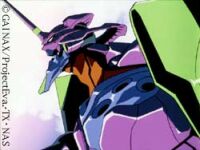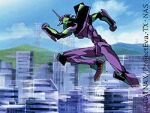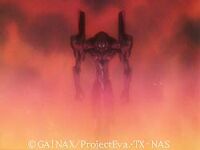How the Silver Screen Inside My Skull Combusted in the Outer World
One of the gentle amusements of my middle age has been to see how much the popular culture around us is coming to resemble the phantasmagoria that used to whirl round and round inside my own skull 30 and 40 years ago. Back in those days, there was little or nothing in the culture at large that answered to the Roman-candle contents of my incandescent imagination. But something has happened since then. There has been an epochal shift. And now when I look around me, it seems in recent years more and more as though the shadow-show that flickered inside my youthful skull has emerged and combusted in the world around us.
I remember when I was a kid, I loved cartoons. Now, back in those days "cartoons" meant Yogi Bear and Huckleberry Hound and Bugs Bunny and whatnot. I loved those cartoons. I still do. But inside my ten-year-old head was a vision of cartoons where epic battles raged. Cosmic forces of evil. Mighty heroes. Strange powers. Energy blasts, explosions! The fate of the world hanging in the balance!

Only back in those days, there weren't such cartoons. "Cartoons" pretty much meant Yogi Bear stealing another picnic basket. Well, actually there was one cartoon on TV that tended in the direction of what I would've preferred: The Herculoids was a wondrously incorrect cartoon about these characters defending their planet against alien invaders. Wham! Zap! Kaboom! My favorite Herculoid was this critter like a ten-legged rhinoceros that fired exploding rocks out of its horn.
I wished they would've had a lot more cartoons like that on. Only they didn't. Back in those days I don't know who else besides myself would've watched the kind of cartoons I really wanted to see. The kind of cartoons that were whirling round and round inside of my skull.

Because the kind of cartoons I was envisioning back then— the kind of cartoons that were precisely nowhere to be found in the world outside my own skull— were a lot more like today's Japanese anime. Believe me, when I was twelve I would've gone crazy over something like the Japanese anime series Neon Genesis Evangelion.

Giant robots— the Evangelions— fighting creatures known as the Angels which are attacking Tokyo-3 in the year 2015. Fifteen years after a catastrophe known as the Second Impact, which wiped out half the human race. Only a few select youth are capable of synchronizing with the Evas and piloting "mankind's ultimate fighting machine" in the battle against the Angels.

Commander Ikari: "Reclassify Evangelion Unit 03 as the Thirteenth Angel! All units, the target must be destroyed!" —Shinji Ikari, piloting Eva Unit 01: "But father, there's a pilot in that Eva, a kid just like myself!" Oh, you can't imagine how I would've loved watching Neon Genesis Evangelion back circa 1968, when I was 12 years old! If, that is, I'd ever dreamed outside of my own imagination that works like that might even exist!
And comic books. Comic books meant Donald Duck, or Archie and Jughead. Which, don't get me wrong, I enjoyed and still enjoy such comics. But I preferred superhero comics. Yeah, DC, that was okay: Superman and Batman; or my own DC favorites, Green Lantern and the Flash. But what I really loved were Marvel Comics. Spider-Man. The Incredible Hulk. The Avengers. Or my very favorite comic from Marvel was the Fantastic Four.
What I loved about the Fantastic Four was not only Jack Kirby's brilliant, free-flowing artwork, which made DC's artwork look like stodgy, crisp banknote-engraving by comparison. Not only the free, loose, wide-open "fate of the world hanging in the balance" stuff, Johnny Storm going up in a hopeless last-ditch battle against the cosmic might of Galactus: "All right, if this is going to be Earth's last stand, let's do it up right!
I suppose these comics must've been selling out there to someone besides myself. But I grew up in a world where really nobody but myself was into comics. Nobody but myself was into the Fantastic Four or Spider-Man. My own folks were cool with comics, but I knew a lot of adults whose attitude was, child, don't touch those eeeeevil publications, they'll rot your mind out like a four-color computer virus.
Little could I have imagined back then that in my adult years, by the 1980s and on into the 90s, I'd be seeing comic books like Nexus, or Matt Wagner's Mage, or Alan Moore's stunning Miracleman. Little would I have dreamed that what once cycled round and round in my own mind would one day combust in the theaters in the form of Spider-Man or the Fantastic Four movies. Movies with special effects like in those days were to be seen nowhere outside of my own skull.
Likewise science fiction. I used to read and love science fiction books. By the time I was in junior high and high school, I was already amassing my own library of science fiction paperbacks. Robert Heinlein. Isaac Asimov. Arthur C. Clarke. John Brunner. James Blish. Clifford Simak. "Doc" Smith. Alfred Bester. Larry Niven. Poul Anderson. Ray Bradbury. Ursula Le Guin. Jack Vance. Roger Zelazny. Frank Herbert. Theodore Sturgeon. Problem was, back in those days, 60s and early 70s, science fiction was even more of a marginalized, ghettoized, disreputable genre than comic books were. I mean, science fiction in those days was a disreputable "pulp" genre, rather like lurid true crime tabloids.
Never would I have dreamed back then that one day science fiction would enter the cultural mainstream. It started in the late 70s, with the appearance of the first Star Wars movie. Yet long before that, my mind would've been ready. I was already long writing my own science fiction stories with strangely Star-Wars-like elements in them. Yes, my stories included a handheld energy-arc-wielding device called a nimbic torch years before I ever heard of light sabers.
And from the time I first read Robert Heinlein's "They," my efflorescent mind was primed for the likes of The Matrix. Yes, The Matrix. Let's not get into an alien race called the Esloniki in my stories, who practiced a surreal martial art called the feng cra, leaping and pirouetting in slow-motion defiance of gravity, chopping effortlessly through wood and steel and concrete, walking through walls, stopping bullets, balancing on a sword's razor edge. It was all there in my head circa 1972.
Humor. I remember living in a world where humor meant Red Skelton or Carol Burnett or Jackie Gleason, and nothing more. I mean, talk about stiff! Talk about embalmed! Then I went away to college, and stumbled across Monty Python, which approximated the style of humor which had already been whirling around in my gourd without proximate outward analog. And we live today in a world in which Monty-Pythonesque humor has become mainstream.
Music. Well, I first came to an awareness of myself and the world around me in the late 60s. Here the driving beat of rock music got through to many of my friends as it got through to me. I was not so alone in my musical tastes as I was in so many other areas. But I remember a time when rock was truly subversive, truly countercultural, truly outside the "grown-up" mainstream of our culture. It belonged to my generation, and not to as many of us as you might imagine looking back. I remember when I first realized that rock was entering the mainstream: it was 1976, and they were playing rock music during halftime at a football game on TV— which, at the time, stunned me. Yes, we live in a world today where rock is part of the mainstream culture. Incredible as that would've seemed to me back in the late 60s.
So many of my younger interests were odd, obscure, hard to find anything on them back in those days. Shogi or Japanese chess. Postage stamp countries like Liechtenstein or Andorra. Synaesthesia. The likelihood of planets outside our solar system. Self-constructed languages, such as my own Hermetic language. Shortwave radio and radio DXing.
Something has happened in the culture at large in the years and decades since then. The old culture, the culture of Yogi Bear and Carol Burnett, got some of the starch knocked out of it. And a hundred flowers have opened up and bloomed, in living technicolor. More variety. More breadth and depth. Much richer detail available on almost any odd topic you care to name. On a cultural level, on the simple level of images that flit through the mind's eye, the doors of perception have been opened wide.
The Internet has facilitated this process, and enabled people of like interests to connect. But the blooming I've witnessed in my time was already under way, 15 and 20 years ago, back before Internet access became widespread.
And the odd thing is, those images, those hundred flowers, were already flitting through my mind's eye 30 and 40 years ago. The older I get, the more our popular culture approximates to the lifelong shadow-show within my own mind.
Labels: auld_lang_syne, rants








5 Comments:
glad i came along when all this was already blooming in the world
i don't think i could stand living on a diet of yogi bear and carol burnett, much less people who are stuck on the horrors of four color computer viruses for the brain aka comic books
and think what i can look up on google in seconds compared to someone in a small town library 40 years ago
I recall there were Japanese cartoons featuring robots (e.g., Atom Boy, 8-man, and Gigantor) as well as a TV program called Laugh-In.
Some to think of it, the first time I heard of Monty Python was when somebody compared it to Laugh-In.
Yeah, I was vaguely aware as a kid that there were more interesting cartoons available on the "big city" TV stations. Which however were out of reception range where I lived.
That's another aspect of this whole phenomenon. My memory is that there was a much steeper cultural gradient in those days between the big city and the hinterlands. Even between the big city and the not-so-big city.
I grew up in a small town in southern Wisconsin, up north of Madison. I remember there were only a couple of bookstores in Madison where one could find a wide selection of new books in print: University Book Store and Pic-A-Book were pretty much it. There was also a handful of small specialty or used bookstores. When WaldenBooks arrived in Madison in the early 70s, it represented a stunning increase in the availability of new book titles. Compare that to today: Walden would be a drop in the bucket compared to all the many, many bookstores in Madison today, including multiple gigantic Borders and Barnes & Noble stores, to say nothing of the zillions of used bookstores including two Half Price Books outlets.
And if I can't find it nowadays in meatspace, I can find it somewhere online. Just yesterday I ordered two books I couldn't find on Amazon.com. But I could find them on Amazon.co.uk.
I remember the small town I grew up in; it was in some ways reminiscent of Sinclair Lewis's Main Street. I don't find that anymore in the small-town and rural areas where I've lived in recent years. Something has opened up. The doors of perception have opened wide.
Twenty years ago, there used to be quite a few used & rare book stores in Manhattan. As rents rose, they closed. But the Internet has made it possible for them to spring up in low-rent places around the country.
The original Astroboy (aka Atom Boy) appears to have been the fount of anime. I remember the first time that I saw Japanese comicbooks in a store somewhere, I was surprised at how the drawing style of all of them reminded me of Astroboy. It was a favorite of mine when I was a kid, and it was less politically correct than the later version. At least, in Englsh. They changed the words of the theme, etc., which used to say things like "Astroboy bombs away!" instead of "He will save us! He will save us!"
Original opening in English: http://www.youtube.com/watch?v=R4KT3O-9F3I
On the other hand, the new English version's tune seems closer to the original Japanese version http://www.youtube.com/watch?v=D4HVYZhohGw.
As a kid, I wasn't aware just what was available out there, in the way of "good cartoons"— only that, since we were out of reception range of the Chicago TV stations, I really didn't have a chance. In the Madison area we never even got to see Godzilla movies on TV.
To give you an idea of what I would've liked to see on TV, back around age 12, circa 1968, here's a fight scene from Neon Genesis Evangelion episodes 1 and 2:
http://www.youtube.com/watch?v=ENNdBOlWYd8
In this scene, the boy Shinji Ikari has never even seen a giant robot before, much less piloted one. But he's their last hope— the only person available who's capable of "synchronizing" with an Eva— so they just shove him in the entry plug of Eva Unit 01, and send him out, with no practice or experience, to fight Sachiel, the Third Angel.
As you can see, it's not exactly Yogi Bear! And not exactly something that's likely to turn up as a cartoon on most US TV stations any time soon. Though like I say, it's the kind of thing I just would've loved as a kid.
Post a Comment
<< Home